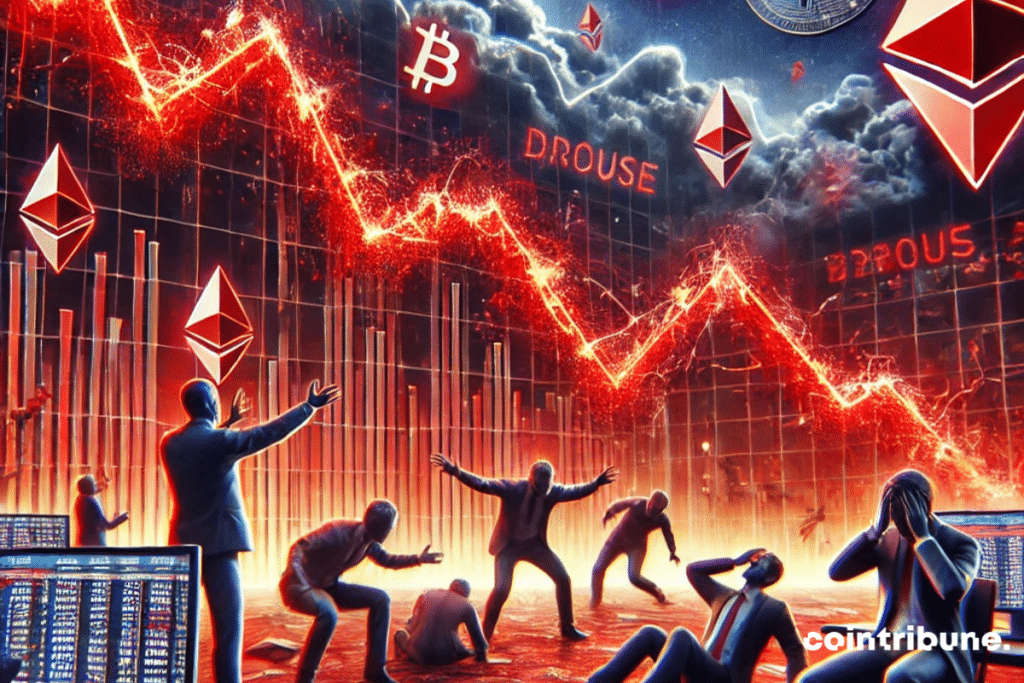Crypto: $2.24 Billion Liquidated… Traders in Shock!
The crypto market has just experienced an unprecedented financial tsunami. In 24 hours, $2.24 billion vanished under the blows of tariff wars, propelling Ethereum to the forefront of a historic debacle. A massive liquidation, driven by Donald Trump’s surprise announcement on tariffs, shattered the records of the FTX crisis and the COVID-19 crash. Behind these staggering numbers, over 730,000 traders saw their positions turned to ashes.

Ethereum, the first victim of a cascading crypto liquidation
In crypto, hopes for a rise can turn into a deadly trap. The proof: 84% of the liquidations involved long positions, translating to $1.88 billion lost by traders betting on a rebound.
A paradox? Not really. The frenzy around Bitcoin ETFs, which attracted $5 billion in January, fueled blind optimism.
But Ethereum, the uncontested star of cryptos, has crystallized tensions. With $609.9 million liquidated solely on its contracts, ETH acted as a detonator for a chain collapse.
Exchange platforms are never neutral. Binance, the undisputed giant, absorbed 36.8% of the liquidations alone, according to CoinGlass.
A record liquidation order of $25.6 million on the ETH/BTC pair symbolized the frenzy of algorithms. OKX, Bybit, and Gate.IO followed suit, revealing a systemic vulnerability: the more liquid an exchange is, the more it becomes a panic accelerator.
The comparison that sends chills down the spine
Joe Consorti, an analyst at Theya’s Bitcoin, dares to use a shocking metaphor: “This Trump crash surpasses the FTX effect and the COVID chaos.” A chilling warning.
In February 2023, the Fear & Greed index plunged into the red zone, signaling extreme fear. Yet, history reminds us: these moments of panic often precede spectacular rebounds. Crypto, an eternal cycle of rebirth?
Markets hate the unknown. The announcement of tariffs against China, Canada, and Mexico acted like a shockwave. In one hour, Ethereum and Cardano plummeted by 10%, dragging billions in capitalization with them.
An excessive reaction? Maybe. But crypto, a young and hyper-reactive market, amplifies every geopolitical tremor. Algorithms, programmed to anticipate risks, turned a protectionist measure into a global crisis.
Bitcoin ETF vs. Liquidations: the duel of narratives
Ironically, as liquidations accelerated, Bitcoin ETFs continued to siphon traditional savings. Nearly $50 billion in inflows are expected by 2025, according to analysts.
A contradictory signal? Not really. These structured products attract institutional clients, who are less sensitive to the fluctuations of altcoins. This proves that crypto is fracturing into two universes: that of speculative bets and that of “secure” investments.
The *Fear & Greed* index shows a persistent “fear” sentiment, according to Alternative.me. A feeling that hides an unknown reality: massive liquidations clean the market of fragile positions, offering insiders discounted prices.
After all, Bitcoin survived Mt. Gox, COVID, and the fall of FTX. Why not Trump? The key lies in patience… and in the art of turning a disaster into an opportunity despite the experts’ concerns following the collapse of crypto XRP.
Maximize your Cointribune experience with our "Read to Earn" program! For every article you read, earn points and access exclusive rewards. Sign up now and start earning benefits.

Fasciné par le bitcoin depuis 2017, Evariste n'a cessé de se documenter sur le sujet. Si son premier intérêt s'est porté sur le trading, il essaie désormais activement d’appréhender toutes les avancées centrées sur les cryptomonnaies. En tant que rédacteur, il aspire à fournir en permanence un travail de haute qualité qui reflète l'état du secteur dans son ensemble.
The views, thoughts, and opinions expressed in this article belong solely to the author, and should not be taken as investment advice. Do your own research before taking any investment decisions.